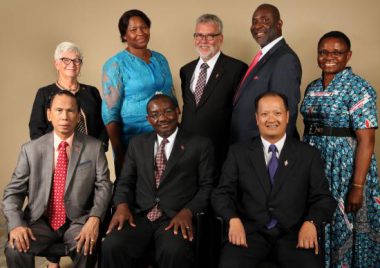Bright Spots in a Confusing Decision
Last week’s decision by the Judicial Council regarding the election and consecration of an openly lesbian bishop in a same-sex marriage was very complicated and not entirely consistent. The Council strove to tailor its decision as narrowly as possible and delved into many legal technicalities. In the midst of all the complexity, it would be easy to lose sight of several positive aspects of the ruling.
1. The Judicial Council clearly and forcefully upheld the principle that a jurisdiction’s bishops, acting on behalf of the whole United Methodist Church, cannot legally consecrate as bishop a person who does not meet the qualifications for office. The Western Jurisdiction had maintained that it could elect and consecrate whoever it thought would be an appropriate bishop in light of their particular context, and that the rest of the church could say nothing about their choice. The ruling recognized that bishops are bishops of the whole church and that jurisdictional bishops are acting on behalf of the whole church when they consecrate a bishop. No jurisdiction or annual conference is completely autonomous. We are part of a connection that is responsible and accountable to each other.
2. The Judicial Council clarified that “a same-sex marriage license issued by competent civil authorities together with the clergy person’s status in a same-sex relationship is a public declaration that the person is a self-avowed practicing homosexual.” This important ruling will put an end to games that some openly homosexual clergy have been playing by living in a same-sex marriage, yet declining to acknowledge that they are practicing homosexuals. Rather than requiring church authorities to ask intrusive questions about the personal lives and practices of clergy, all that is now necessary for a person to be brought up on a complaint is the public record of being in a same-sex marriage. The Judicial Council recognized that being in a marriage assumes a sexual relationship, and that it would then be up to the clergyperson under complaint to give “rebuttal evidence” during a complaint process to refute that assumption in an individual case. This should make it much easier and more straightforward to hold accountable some clergypersons who are living contrary to the moral teachings of the church.
3. This decision also puts the spotlight on the Western Jurisdiction to make a decision about the future of The United Methodist Church and its participation in that future. The jurisdiction will have to decide between equally unsatisfactory alternatives. Either it will have to remove from office (and from clergy status) a person that it unanimously supported as bishop, or it will have to openly acknowledge that it can no longer be part of The United Methodist Church as it is currently configured.

Judicial Council, UMNS
“This ruling really does nothing to resolve the tension and impatience and anxiety in our system. It’s not clear-cut enough,” Bishop Bruce R. Ough, president of the United Methodist Church’s Council of Bishops, told the New York Times. “One of the tensions that will play out now within our denomination in the next few months is people will be watching carefully whether the Western Jurisdiction College of Bishops will in fact follow through and do the due process, and do it well.”
The jurisdictional leaders may seek some kind of “just resolution” that leaves Bishop Karen Oliveto in office. But unlike the cases of clergy performing same-sex marriages, there is no middle ground here to find compromise for a resolution. Either Oliveto meets the qualifications for continuing in her clergy status or she does not. And if she does not, the only option is to remove her as bishop and revoke her credentials. No 24-hour suspension consequence is available as a “just resolution.” The Western Jurisdiction’s decisions over the coming months will speak volumes about the ability of progressives and traditionalists to live together in the same church body.
As expected, the Judicial Council decision did not resolve the impasse in our denomination over the role of LGBTQ+ persons in the life of the church. The only bodies with the authority to resolve the impasse are the Commission on a Way Forward, the Council of Bishops, and the special General Conference. As I understand it, the Commission’s final plan needs to go to the Council of Bishops for approval in May 2018. The Council of Bishops then needs to submit it in legislative form by July 2018 in order to meet the deadlines for the February 2019 General Conference. So we will know a year from now the final proposal that will be put before the called General Conference. Until then, we encourage United Methodists to remain steadfast in prayer and continue as members of their local churches, so that the evangelical voice is undiminished in helping to form whatever comes next.

I do not see anything inconsistent. I may be failing to read the post correctly. Perhaps the JC ruled and left expelling the lesbian Bishop as the DUTY of the Western Council. The ruling sounds as if it supports ONLY this. Due Process does not allow any other just resolution. The only options are obedience and disobedience. Disobedience will require removal from the UMC. The alphabet soup of sexuality should be loved and be part of the Church but not hold positions of authority.
1. The consecration may not have been legal but since she is a bishop in good standing an illegal consecration still works for the WJ.
2. A marriage license amounts to self-avowal. Easily ignored via the just resolution process. Just like any other rule they don’t like.
3. The WJ has a third choice. It can keep her as bishop and simply say that is how it stands. We are not leaving and neither is she. The Judicial Council has no way to enforce its rulings.
Without the declaration that the election is null and void the Judicial Council made things even worse. Clarity is what was needed and we got fog.